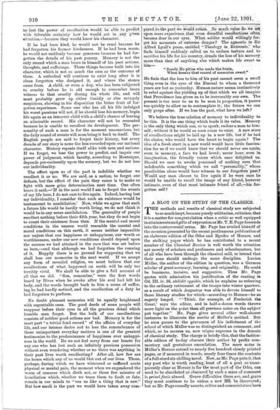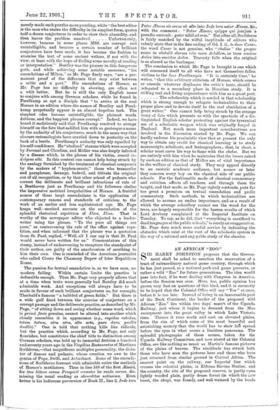. A BLOT ON THE STUDY OF THE CLASSICS.
TIRE methods and results of classical study are subjected 1 to so much inept, because purely utilitarian, criticism, that itis a matter for congratulation when a critic so well equipped in attainments and gifts of expression as Mr. T. E. Page descends into the controversial arena Mr. Page has availed himself of the occasion presented by the recent posthumous publication of an elaborate edition of the Odes and Epodes of Horace, and the striking paper which he has contributed to a recent number of the Classical Review is well worth the attention not merely of scholars and professors and schoolmasters; but of all who have been through the classical mill, or intend that their sons should undergo the same discipline. Lucian Muller, the author of the edition in question, was a German scholar of great accuracy, learning, and originality. He could be luminous, incisive, and suggestive. Thus Mr. Page quotes with- admiration his justification of the reading in Od. M. iv. 38, abdidit oppiclis, which be explains as referring to the ordinary retirement Of the troops into winter quarters, as a result of which Augustus was able to devote himself to those literary studies for which—according to Horace—he so eagerly longed. "'Think, for example, of Frederick the Great,' says the editor, and in half-a-dozen words throws more light "on the point than all previous notes on the subject put together." Mr. Page gives several other well-chosen instances to illustrate the merits of Mtillees method. But be soon passes to the gravamen of his indictment of the school of which Muller was so distinguished an ornament, and Which, so he assures us, now reigns supreme in the domain of classical study. The charge is briefly this, that the fashion- able editors of • to-day obscure their author by prolix com- mentary, and gratuitotis einendation. The mere notes in Miiller's Horace extend tO nearly five hundred closely printed pages, or if measured in words, nearly fourtimes the contents of a full-sized six-shilling hovel. Now, as Mr. Page puts it, that any poet who is worth_ reading,' least of all a poet _ so trans.; Parently clear as Horace is for the Most part of the Odes, can need to be elucidated or obscured by such a massof comment is primei, facie absurd. Grave difficulties there are and grave they must continue to be unless a new ms. be aiscovered ; but as Mr. Page roundly asserts, critics and commentators have
merely made such puzzles more puzzling, while" the best editor is the man who states the difficulty in its simplest form, quotes half-a-dozen conjectures in order to show their absurdity, and
then leaves the problem unsolved Unfortunately, however, because in some places MSS. are corrupt and unintelligible, and because a certain number of brilliant conjectures have been made, it has become the fashion to examine the text of some ancient writers, if not with the view, at least with the hope of finding some novelty of reading or interpretation." Bentley was the pioneer in this dangerous path, and while achieving some notable successes, "his• emendations of Milton," as Mr. Page finely says, "are a per- manent proof of the difference that may exist between a critic and a poet." His emendations of Horace, as Mr. Page has no difficulty in showing, are often not a whit better. But he is still the only English name to conjure with among German scholars, while he found in Peerlkamp so apt a disciple that "to arrive at the real Horace in an edition where the names of Bentley and Peerl- kamp perpetually appear is an almost hopeless task. The simplest odes become unintelligible, the plainest words dubious, and the happiest phrases corrupt." Indeed, we have beard it maliciously said that Peerlkamp resolved to avenge himself on the fate that saddled him with so grotesque a name by the audacity of his conjectures, much in the same way that obscure entomologists have crawled down to posterity on the back of a beetle. Peerlkamp's audacity was only equalled by his self-confidence. He " obelised" stanzas which were accepted by Juvenal and Claudian, and Muller was also deeply infected by a disease which, in the phrase of his victim, crescit in- dulgens sibi. In this context one cannot help being struck by the analogy furnished by the treatment of classical composers by the makers of "hyphen-music," those who transcribe and paraphrase, derange, bedevil, and titivate the original out of all recognition, or by that other school of pedants who correct the deliberate and brilliant infractions of rule of a Beethoven just as Peerlkamp and his followers obelise the impressive metrical irregularities of Horace. A fruitful source of these inept emendations is the application of contemporary canons and standards of criticism to the work of an earlier and less sophisticated age. Mr. Page heaps well - merited sarcasm on the emendation of the splendid rhetorical repetition of Ilion, Ilion. That is worthy of the newspaper editor who objected to a leader- writer using the phrase, "To the pure all things are pure," as contravening the rule of the office against repe- tition, and when informed that the phrase was a quotation from St. Paul, replied, "Well, all I can say is that St. Paul would never have written for us." Commentators of this stamp, instead of endeavouring to recapture the standpoint of their author, are guilty of the anachronism of ascribing to him their own. One is reminded of the American journalist who called Cicero the Chauncey Depew of later Republican Rome.
The passion for textual emendation is, as we have seen, no modern failing. Within certain limits the practice is defensible enough. Thus Mr. Page very properly allows that at a time when texts were generally bad Bentley did much admirable work. And exceptions will always have to be made in favour of such brilliant conjectures as, for example, Theobahrs famous "a babbled of green fields." But there is a wide gulf fixed between the exercise of conjecture on a corrupt passage and the deliberate practice, as described by Mr. Page, "of sitting down and seeing whether some word, which is printd facie genuine, cannot be altered into another which Closely resembles it in appearance (e.g., rapidus rabidus, tot urn tutum, atra atra, alto arto, puro duro, puellis duellis)." One is told that nothing kills like ridicule, but the practice which, according to Mr. Page, not only flourishes, but constitutes the chief title to distinction among German scholars, was held up to immortal derision a hundred and seventy years ago in the Virgaius .R,estauratus of Martinus Scriblerus,—that magnificent multiplex personality, the dicta- tor of of dunces and pedants, whose creation we owe to the genius of Pope, Swift, and Arbuthnot. Some of the emenda- tions of Scriblerus forecast with admirable satire the methods of Horace's mutilators. Thus in line 188 of the first .2Eneid, for fres littore cervos Prospieit errantes he reads corms, dis- missing the usual reading as absurditas notistima. Even better is his ludicrous perversion of Book II., line 2, Inde taro
Pater 2Eneas sic orsus ab alto into Inde toro satur Zneas,"&c., with the comment : " Satur lEneas, quippe qui jamjam a prandio surrexit pater nihil ad rem." But after all, Scriblerus is fairly matched by the wilful ineptitude of editors who calmly state that lathe fine ending of Od. I. ii., te duce Calar, the word Czsar is not genuine, who " obelise " the proper name in abstulit clarutn cita mors Achillem, or turn amicus Anion into =rictus Anion. Travesty fails when the original is as absurd as the burlesque.
The conclusion to which Mr. Page is brought is one which will commend itself to all who have not themselves fallen victims to the lu‘s Peerlkarnpia. "It is certainly time," he writes, "that this arbitrary criticism of Horace, which erases or amends whatever displeases the critic's taste, should be relegated to a secondary place in Horatian study. It is stifling real and living acquaintance with him as a great poet.
The scholarship which is needed is that scholarship which is strong enough to relegate technicalities to their proper place and to devote itself to the real elucidation of a great writer." One cannot help being struck by the strange irony of fate which presents us with the spectacle of a dis- tinguished English scholar protesting against the tyrannical use of a scholastic weapon which was originally forged in England. But much more important considerations are involved in the discussion started by Mr. Page. We can hardly endorse his pessimistic view that at present the only way to obtain any credit for classical learning is to study manuscripts, scholiasts, and lexicographers ; that, in short, a scholar must carve his way to fame with the obelus. But we are entirely with him when he maintains that the issues raised by such an edition as that of Muller are of vital importance to the welfare of classical study. They may appeal directly to an esoteric academic audience, but sooner or later they concern every boy on the classical side of our public schools. For the fashionable mode of classical commentary and criticism affects all teachers, and through them the taught, and that mode, as Mr. Page rightly contends, puts far too great a premium on textual emendation and prolix commentary. Such methods, in which technicalities are allowed to assume an undue importance, and as a result of which the average schoolboy cannot see the wood for the trees, are largely responsible for the barren results of which Lord Avebury complained at the Imperial Institute on Tuesday. To say, as he did, that "everything is sacrificed to dead languages at the public schools," is surely an exaggeration. Mr. Page does much more useful service by indicating the obstacles which exist at the root of the scholastic system in the way of a rational and enjoyable study of the classics.











































 Previous page
Previous page